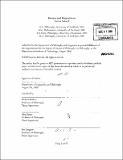| dc.contributor.advisor | Richard Holton, Alex Byrne and Rae Langton. | en_US |
| dc.contributor.author | Ashwell, Lauren Mary | en_US |
| dc.contributor.other | Massachusetts Institute of Technology. Dept. of Linguistics and Philosophy. | en_US |
| dc.date.accessioned | 2010-05-25T20:58:04Z | |
| dc.date.available | 2010-05-25T20:58:04Z | |
| dc.date.copyright | 2009 | en_US |
| dc.date.issued | 2009 | en_US |
| dc.identifier.uri | http://hdl.handle.net/1721.1/55176 | |
| dc.description | Thesis (Ph. D.)--Massachusetts Institute of Technology, Dept. of Linguistics and Philosophy, 2009. | en_US |
| dc.description | Cataloged from PDF version of thesis. | en_US |
| dc.description | Includes bibliographical references (p. 93-95). | en_US |
| dc.description.abstract | In philosophy of mind, desire is an also-ran when it comes to theorizing about mental states - all the attention is on belief, (visual) perceptual experience, and pain. Desire is largely ignored, as it is assumed to be similar enough to belief that one can simply focus on belief, in forming theories of belief and desire. Here I address two areas where I see this assumption as a particular problem. One is in the metaphysics of desire. It has not been recognized that we might have conflicting behavioral dispositions because of an over-focus on mental states that are usually held together coherently: beliefs. Desires, unlike beliefs, are often held together although they conflict; I can both want to have coffee because I love the taste, and also want to refrain because I want to sleep. I argue in chapter 1, for reasons independent of philosophy of mind, that an object can have conflicting dispositions. I then apply this in chapter 2 to argue that having conflicting desires involves having conflicting behavioral dispositions. It is also usually assumed that the first-personal epistemology of belief and desire will be roughly the same. Given this, there have been attempts to extend a promising account of introspection for belief to desire, and I address this in chapter 3. On this account, we know our beliefs by looking out towards the belief's content, without turning inwards to our own mind. I know I believe there is coffee in the cupboard by thinking about the cupboard, and concluding that there is coffee inside. Those who have extended this to desire claim that to know whether I want something, I look out to the world, fixing my attention on the potential object of desire, and ignoring my own mind. | en_US |
| dc.description.abstract | (cont.) I think that although we must of course attend in thought to the object of desire, we also keep one eye on ourselves. The epistemology of desire is unlike that of belief in that we must measure how we feel - to know what we want, our attention is be split between our own minds and the world. | en_US |
| dc.description.statementofresponsibility | by Lauren Ashwell. | en_US |
| dc.format.extent | 95 p. | en_US |
| dc.language.iso | eng | en_US |
| dc.publisher | Massachusetts Institute of Technology | en_US |
| dc.rights | M.I.T. theses are protected by
copyright. They may be viewed from this source for any purpose, but
reproduction or distribution in any format is prohibited without written
permission. See provided URL for inquiries about permission. | en_US |
| dc.rights.uri | http://dspace.mit.edu/handle/1721.1/7582 | en_US |
| dc.subject | Linguistics and Philosophy. | en_US |
| dc.title | Desires and dispositions | en_US |
| dc.type | Thesis | en_US |
| dc.description.degree | Ph.D. | en_US |
| dc.contributor.department | Massachusetts Institute of Technology. Department of Linguistics and Philosophy | |
| dc.identifier.oclc | 608214322 | en_US |

